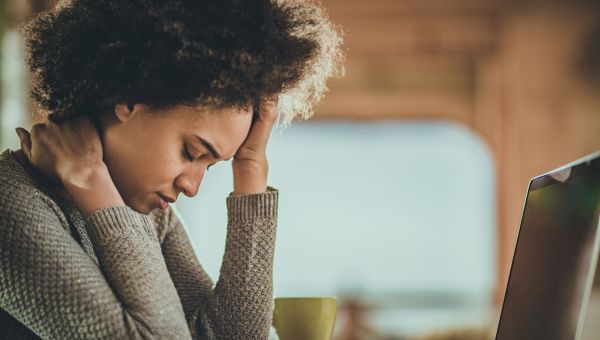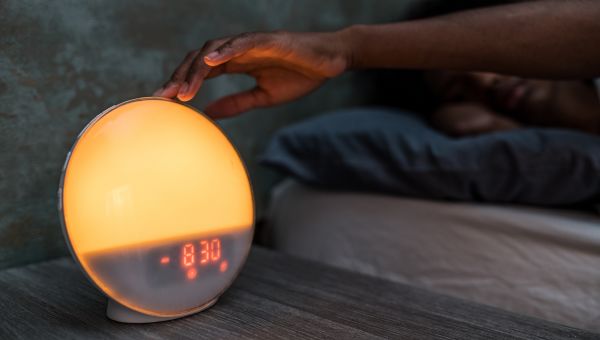5 everyday sources of stress
Learn about lifestyle habits that can lead to anxiety overload.
Updated on November 25, 2024

Stress is a normal part of life, and a certain amount can motivate you to accomplish things. It can keep you energized, sharp, and at your healthiest, most efficient self. But too much stress can sap your mental resources and even make you sick.
Fortunately, we do have some control over stress—and we can change certain habits so we can feel more in control. With… Show More
Stress is a normal part of life, and a certain amount can motivate you to accomplish things. It can keep you energized, sharp, and at your healthiest, most efficient self. But too much stress can sap your mental resources and even make you sick.
Fortunately, we do have some control over stress—and we can change certain habits so we can feel more in control. With that in mind, here are some unexpected sources of stress, plus tips to help manage them.
Show Less
Clutter
A cluttered environment means a cluttered mind, according to Ramani Durvasula, PhD, a licensed clinical psychologist in Los Angeles. “Lots of clutter can lead us to feel hemmed in and disorganized and contribute to a sense of stress,” she says.
One of the easiest ways to turn stress down a… Show More
A cluttered environment means a cluttered mind, according to Ramani Durvasula, PhD, a licensed clinical psychologist in Los Angeles. “Lots of clutter can lead us to feel hemmed in and disorganized and contribute to a sense of stress,” she says.
One of the easiest ways to turn stress down a few notches is by taking the time to get organized. Set aside 20 or 30 minutes each day for a few weeks and toss things you no longer use or need. Once there’s more space, try do a deep clean. If you have an at-home workspace, you may even think more clearly on the job by cleaning up the area.
Show Less
Saying Yes to Everything
Agreeing to every single request that comes your way is a good way to go into stress overload. “There are only so many hours in the day,” says Dr. Durvasula. Some people feel compelled to say yes out of guilt, while others think they don’t have a choice in the matter—when, in fact, they probably do.… Show More
Agreeing to every single request that comes your way is a good way to go into stress overload. “There are only so many hours in the day,” says Dr. Durvasula. Some people feel compelled to say yes out of guilt, while others think they don’t have a choice in the matter—when, in fact, they probably do. “Too many yeses can result in too many demands, not enough resources, and growing resentment, all of which are stressful,” she says.
To help manage this, start setting boundaries. Allow yourself to create them without feeling guilty. Remember that they’re meant to preserve your health. Start by brainstorming different, respectful ways to say no, and be careful not to overexplain your reasoning. Many times, a simple “I’m not available” or “no, thank you” is a perfectly sufficient answer to a request.
Then, enforce your boundaries. For example, turn off your phone after work hours, or block out time on your calendar for yourself. Remind people of your boundaries when necessary.
Show Less
Unhealthy Diet
Eating too much sugar, saturated fat, and salt may seem like a good idea at the time, when you’re stressed out. But it’s important to remember that the feeling of comfort is fleeting, and can lead to health problems over the long term. “Lots of people use food to numb stress, which also impedes our… Show More
Eating too much sugar, saturated fat, and salt may seem like a good idea at the time, when you’re stressed out. But it’s important to remember that the feeling of comfort is fleeting, and can lead to health problems over the long term. “Lots of people use food to numb stress, which also impedes our ability to cope with it,” says Dr. Durvasula. She adds that feeling unhealthy in itself is stressful, and you can add to it by regularly choosing certain foods.
Instead, find other ways to cope in the moment. Try:
- Going for a brief walk or standing up and stretching
- Dialing a friend to talk
- A relaxation technique, like deep breathing or mindfulness meditation
Experiment with different things until you find a stress-relieving activity that works for you.
Show Less
Sleep Procrastination
Do you habitually stay up at night to finish one more episode of Yellowstone or catch up with social media friends? This is sometimes called bedtime procrastination, and it could be leading to stress. Skimping on sleep can cause a nonstop release of cortisol and adrenaline, keeping you on edge and… Show More
Do you habitually stay up at night to finish one more episode of Yellowstone or catch up with social media friends? This is sometimes called bedtime procrastination, and it could be leading to stress. Skimping on sleep can cause a nonstop release of cortisol and adrenaline, keeping you on edge and setting you up for a high-stress day.
To help address this, try these tips:
- Keep screens—including your phone—out of your bedroom. Turn off all screens 30 to 60 minutes before bedtime.
- Create a short, relaxing bedtime routine. It could involve soft music, reading, or bathing.
- Try to go to bed and wake up around the same times each day.

Not Having a Routine
Starting the day without a plan not only contributes to chaos, it can make easy tasks seem like huge obstacles. “Routines ground us and help hardwire habits so that we are more efficient,” says Dr. Durvasula. “Knowing where things are and having things we can anticipate helps us better cope with… Show More
Starting the day without a plan not only contributes to chaos, it can make easy tasks seem like huge obstacles. “Routines ground us and help hardwire habits so that we are more efficient,” says Dr. Durvasula. “Knowing where things are and having things we can anticipate helps us better cope with the unexpected. The lack of routine can leave us inefficient, disorganized, and internally chaotic.”
Try these tips to create an efficient morning routine:
- Do what you can the night before. Set out your outfit, pack your lunch—anything that might help you get through the next morning.
- Set your alarm for around the same time every day. Open the shades immediately to let in natural light and cue you that the sun is up. You may want to have a glass of water waiting on your nightstand. Light stretching can also help awaken you.
- Eat a healthy breakfast. It can help keep you energized through the morning.
- Create a rough schedule. Print it out and post it in your home where you can see it. You can also set alarms to keep you on track.
If you are able, try to prioritize getting some physical activity each morning. Exercise is a well-known stressbuster, and regular exercise imparts the most benefits. Even a short walk or yoga routine can set you up for the rest of the day—and eventually, much longer than that.
We can reduce stress together, one person at a time.
Show Less
American Addiction Centers. The Mental Health Benefits of Cleaning, Organizing & Decluttering Your Space. June 1, 2023.
Intermountain Health. Can organizing impact your mental health? November 17, 2023.
National Alliance on Mental Health. Boundaries: What are they and how to develop your own. 2024.
National Alliance on Mental Health: Wake County. Creating and Maintaining Healthy Boundaries. Accessed November 25, 2024.
Harvard Health Publishing. Why stress causes people to overeat. February 15, 2021.
National Sleep Foundation. 10 Tips for a Better Night’s Sleep. Accessed November 25, 2024.
National Alliance on Mental Health. The Power of a Morning Routine. August 9, 2017.
Mayo Clinic. Exercise and stress: Get moving to manage stress. August 3, 2022.
More On


video

article

slideshow


video


video
